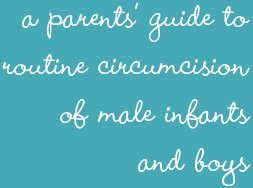Circumcision

The playful typeface and calm baby
seem intended to be soothing and reassuring. The use of "routine" suggests the subject is of little importance. Why is the RACP even issuing a guide to something it does not recommend?
|
|
 |
The aim of this leaflet is to clarify current information about circumcision
to help you decide whether to have your son circumcised.
When even the official current information is that
"there is no medical indication for infant circumcision"
there is no reason parents should even be asked to decide
whether to have their sons circumcised.
For decades, New Zealand parents have not been asked.
|
What is circumcision?
|
Circumcision is the operation to remove [cut off] the foreskin,
which is the flap of skin naturally covering the tip of the penis.
[No, the foreskin is made of FLESH. It is an integral part of the tip of the penis.]
|
Circumcision has been performed on boys for several thousands of
years. It probably started out as a hygienic measure in communities
living in hot, dry, dusty climates [There is no evidence for this common claim] and then became a cultural and
religious ritual which has continued to this day. In the last 100 years,
circumcision rates gradually increased and circumcision became a
fairly routine practice in most English speaking countries by the
1950s. [This falsely suggests that modern medical circumcision is continuous with ancient ritual circumcision. There is no connection.] However, by the 1980s, the trend had reversed and about 40% of infant boys were then being circumcised in Australia. In the 1990s, the rate continued to fall and now fewer than 10% of boys are circumcised [much fewer in some states]. In many European countries the rate is even lower. [Much lower, and virtually zero among New Zealand caucasians and Maori. It is odd that the Royal Australasian College of Physicians fails to mention this.]
| |
Most circumcisions today are carried out for family, cultural or
religious reasons. Some parents choose the procedure for social
reasons such as to be similar to other family members, or because of a preference for the look of a circumcised penis.
[No mention of the ethical questions raised by these practices in the RACP's own policy, nor the sheer weirdness of performing surgery - and only ever this surgery - on a newborn for this kind of reason.]
Sometimes circumcision needs to be performed for medical reasons, such as
when the foreskin is excessively tight (despite appropriate
treatment). [A tight 'pinhole'
foreskin, attached to the glans, is normal in infants and boys and does not
require treatment. For true phimosis, once all medical or stretching regimens have failed, there are still surgical alternatives to circumcision that preserve the foreskin. These are commonly used in Europe.]
Whatever the reason for considering circumcision, parents should
think through both the possible risks and possible benefits of this
operation on their child.
|
Why CHOOSE NOT to have your son circumcised?
Some reasons why parents choose not to have their sons
circumcised are:
- Parents may wish to preserve the natural state of their newborn
child and to avoid any surgical intervention, unless it is essential.
- Any surgical procedure carries some risk, and this is also the
case for circumcision. Complications are uncommon and
include local infection, bleeding and, rarely, damage to the tip
of the penis.
[Note the double minimisation - "uncommon" and "rarely" of reasons not to circumcise. Death is a complication that has almost certainly been underreported.]
- Some people believe that removal of the foreskin may lead
to less sensitivity of the tip of the penis, perhaps causing less
sexual pleasure later in life.
[Note the triple minimisation - "some", "may" and "perhaps" - and again a definition of "the tip of the penis" to exclude the foreskin. There is NO doubt that circumcision causes less sensitivity to the foreskin.]
- Circumcision can be [no, is always] painful for the child, both at the time of the
operation and for some days after.
- [An intact body is a human right.
]
|
Why CHOOSE circumcision for your son?
[note the different wording, as if circumcision is a gift]
Recent research suggests that:
- Circumcision may lower a boy’s chances of getting a urinary tract
infection, particularly in the first year of life. A number of studies
have shown that circumcised infants run a risk of about one in
500 of getting a urinary tract infection, whereas the risk for boys
who are not circumcised is around one in 100.
[So circumcising 500 boys doesn't protect 496 of them from UTIs - which are always treated without surgery in girls.]
- Circumcision eliminates the risk of infections under the foreskin
which may happen in infancy and later in childhood. [Yes, cutting off a body part eliminates the risk of infections in that part. We don't do it anywhere else, though.] Nevertheless, there is a small risk of inflammation of the extreme
tip of a circumcised penis, particularly in infancy.
[In other words, circumcision replaces one small risk with another.]
- Circumcision almost eliminates the risk of developing cancer of
the penis later in life. [No, only cancer of the foreskin.] It should be stressed, however, that this is a
very rare condition with an incidence of 1 in 100,000.
- Circumcised men run a lower risk of getting sexually transmitted
diseases [false], perhaps including AIDS, than men who are not circumcised. [It's a big "perhaps"]
However, circumcision is no substitute for appropriate public health measures (such as condom use).
[Of course. So why even mention this reason?]
|
After extensive review of the literature, the Paediatrics & Child Health Division of the Royal Australasian College of Physicians has concluded that there
is no medical reason for routine newborn male circumcision.
[The emphasis - not in the original policy - suggests that
"discretionary" newborn male circumcision has some justification.
In fact, the original policy concurs with an earlier statement that
"Neonatal male circumcision has no medical indication." No mention of "routine".]
Summary
In our community today, there are some people who strongly favour, and many who are
strongly opposed to, circumcision of boys. Parents need to be aware that there are conflicting
points of view about the risks as well as the possible benefits of circumcision.
If circumcision is to be performed, parents and their doctor should ensure that it is done by an
experienced and competent person [How are they to do this - especially given that circumcision is commonly used for surgical training, and can be botched by the most experienced operators?] using an appropriate anaesthetic.
To reduce the risks and the discomfort for the child, the operation is best performed under a general anaesthetic after the age of six months. [The original RACP policy gives no indication that the operation is best performed at all.]
|

